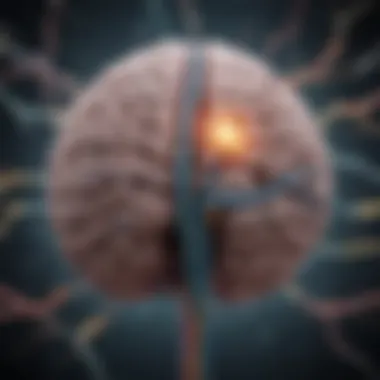Medicinal Strategies for Enhancing Memory Power


Intro
The pursuit of improved memory is a constant theme in both healthcare and cognitive research. With advancements in pharmaceutical sciences, certain medications have been developed with the intention of enhancing cognitive abilities. This article endeavors to provide an in-depth exploration of these medications, highlighting their mechanisms of action and the clinical evidence supporting their effectiveness.
Understanding memory enhancement through medicine requires careful navigation through a variety of disciplines. Various healthcare practices, neuroscience, psychology, and even education play significant roles in this field. Therefore, it is crucial to consider how these realms intersect when discussing cognitive enhancement.
Article Overview
- Purpose of the Article
The primary aim of this article is to clarify the landscape of medications designed to improve memory. This includes analyzing their effectiveness, exploring ethical considerations, and contrasting them with non-pharmacological alternatives. By dissecting these elements, it seeks to inform readers about the complexities and realities of cognitive enhancement. - Relevance to Multiple Disciplines
The discussion on memory power is not limited to pharmacology alone. Cognitive enhancement straddles several fields including neuroscience, psychology, and education. Findings in one domain can inform practices in another, yielding a more integrated approach to improving memory. The ethical implications of using these medications also invite dialogue across disciplines, addressing moral considerations in research and practical applications.
Research Background
- Historical Context
The use of substances to enhance cognitive function has a long history. From ancient herbal remedies to modern pharmacological agents, the desire to boost memory links many cultural practices. Research in the 20th century paved the way for a deeper understanding of the brain, leading to the development of targeted therapies aimed at improving memory. - Key Concepts and Definitions
To engage in this discourse, it is vital to define what is meant by memory power improvement. Broadly, cognitive enhancement refers to any intervention, be it drug-based or lifestyle-oriented, aimed at boosting various aspects of cognitive function, particularly memory retention and recall.
End
This article seeks to bridge various perspectives and fields to deliver a comprehensive overview of medications for memory enhancement. The balance of pharmacological and non-pharmacological approaches will be explored alongside the necessary ethical considerations. Through this synthesis, the aim is to enrich the reader's understanding of the current landscape in cognitive enhancement.
Foreword to Memory Enhancement
Memory enhancement is a crucial topic within the field of cognitive sciences. It encompasses various strategies and methods aimed at improving memory function. This article delves into both pharmacological and non-pharmacological approaches, discussing their benefits and implications. The significance of this topic lies in its multifaceted nature. Memory is not merely a repository of information; it influences our learning, decision-making, and overall quality of life.
Understanding how to enhance memory can lead to substantial advantages in educational and professional settings. Furthermore, with an increasing population experiencing cognitive decline, the need for effective memory-boosting solutions is more pressing than ever.
By exploring these solutions, individuals can recognize the potential pathways to improving their cognitive capabilities. It will also shed light on the ethical dimensions that accompany the use of memory-enhancing drugs, ensuring a comprehensive understanding for all stakeholders involved.
Understanding Memory
Memory serves as the foundation for our experiences and knowledge. It can be divided into short-term and long-term memory, each playing a unique role in how we process and retain information. Short-term memory allows us to hold onto information temporarily, while long-term memory enables us to store experiences and knowledge for later retrieval.
This process is complex, involving various regions of the brain, such as the hippocampus and the prefrontal cortex. Each of these brain areas contributes to different aspects of memory, from encoding information to retrieval processes.
Moreover, memory is not a static process, but rather a dynamic one that can be cultivated and enhanced through different techniques and interventions.
Importance of Memory in Daily Life
Memory plays a critical role in daily life.
- Learning: Memory allows us to learn new skills and acquire knowledge, foundational for personal and professional growth.
- Decision-making: Often, our decisions are influenced by prior experiences and learned information stored in memory.
- Relationships: Our ability to remember details about others fosters connections, forming the basis of our social lives.
- Daily Functioning: From remembering to turn off the stove to recalling vital appointments, memory is integral to our independence and quality of life.
Essentially, memory serves as a tool for navigating the complexities of life, highlighting its necessity beyond mere academic contexts.
"Memory is the treasure house of the mind wherein the monuments thereof are kept and preserved."
"Memory is the treasure house of the mind wherein the monuments thereof are kept and preserved."
In today's fast-paced environment, the ability to remember effectively becomes even more valuable. As we seek ways to enhance this skill, understanding memory enhancement becomes paramount.
Pharmacological Approaches
The exploration of pharmacological approaches to memory enhancement is a crucial aspect of understanding how medicinal compounds can influence cognitive processes. This segment outlines various medications specifically designed to improve memory function, highlighting their potential benefits and considerations. Pharmacological interventions offer targeted solutions for enhancing memory, especially in populations experiencing age-related cognitive decline or specific disorders. However, it is important to maintain a balanced view regarding their use, efficacy, and the implications on overall mental health.
Overview of Memory-Enhancing Medications
Memory-enhancing medications are particularly relevant in the context of cognitive decline, where individuals may face challenges in recalling information or performing tasks that require mental agility. There are a variety of medications marketed with the aim of boosting memory and cognitive functions. These include drugs that enhance neurotransmitter activity, stimulate brain regions responsible for memory, or exert neuroprotective effects.
These medications can be classified based on their mechanisms and intended uses, as detailed in the following sections. Understanding the distinctions between each category is vital for both professionals and individuals interested in enhancing cognitive function through medicinal means.
Categories of Memory-Enhancing Drugs


Cholinergic Agents
Cholinergic agents are a central focus in the pharmacological enhancement of memory. These substances work primarily by increasing levels of acetylcholine, a neurotransmitter essential for learning and memory processes. The most prevalent medication in this category is donepezil, commonly prescribed for Alzheimer’s disease.
A key characteristic of cholinergic agents is their ability to improve synaptic transmission. This is vital for memory consolidation and retrieval. Cholinergic medications are often viewed as a beneficial choice for treating cognitive impairment in elderly patients.
Nearly all cholinergic agents come with advantages and disadvantages. While they contribute significantly to memory enhancement, they may also result in side effects such as gastrointestinal issues or insomnia, necessitating careful monitoring.
Nootropics
Nootropics, often referred to as smart drugs, encompass a broad range of substances that purportedly enhance cognitive function, particularly executive functions, memory, creativity, or motivation. One notable nootropic is racetam, which has gained popularity in both academic and recreational circles.
The primary feature of nootropics is their versatility; they are often used by students or professionals seeking to improve focus and productivity. While there is anecdotal evidence supporting their efficacy, substantial clinical research remains limited. This makes them a somewhat controversial option in the cognitive enhancement arena. Users should weigh potential benefits against reported side effects like headaches and insomnia.
Stimulants
Stimulants are a widely recognized category of memory-enhancing drugs, primarily used to treat attention deficit hyperactivity disorder (ADHD). Medications such as methylphenidate and amphetamines increase dopamine and norepinephrine levels, enhancing focus and, in some cases, memory retention.
A significant characteristic of stimulants is their ability to provide immediate cognitive benefits. This makes them popular for those needing quick enhancements in concentration. However, their long-term effects on memory enhancement are less clear, and there are risks of dependence or cardiovascular issues, making their usage a careful consideration.
Antidepressants
Antidepressants, while primarily used for mood disorders, also show promise in improving memory function. Certain selective serotonin reuptake inhibitors (SSRIs) have been studied for their potential benefits in memory, particularly in patients suffering from depression-related cognitive impairment.
The unique feature of this class of drugs is their dual action on mood and cognition. Enhanced mood may lead to improved cognitive functions, including memory. However, antidepressants can have side effects such as weight gain and decreased libido, and their efficacy in memory enhancement may vary significantly among individuals.
"Within the realm of cognitive enhancement, understanding the unique contributions of each drug category is crucial for tailoring effective interventions."
"Within the realm of cognitive enhancement, understanding the unique contributions of each drug category is crucial for tailoring effective interventions."
Mechanisms of Action
Understanding the mechanisms of action for memory-enhancing medications is central to evaluating their effectiveness. This section will explore the specific ways in which these drugs interact with the brain’s systems to bolster memory capacity. By examining these elements, researchers can clarify the potential benefits and limitations of pharmacological interventions in cognitive enhancement.
Cholinergic Mechanisms
Cholinergic mechanisms involve the neurotransmitter acetylcholine, which plays a critical role in memory formation and learning. Enhancing cholinergic activity has shown promise in improving cognitive functions, particularly in those with memory deficits. Drugs like donepezil and rivastigmine work by inhibiting acetylcholinesterase, the enzyme that breaks down acetylcholine. This leads to increased availability of acetylcholine at synapses, potentially enhancing communication between neurons. Such interactions are vital in areas of the brain involved in memory processes, such as the hippocampus.
Additionally, studies suggest that individuals with Alzheimer’s disease may benefit from cholinergic drugs since they often exhibit low acetylcholine levels. The use of these mechanisms not only seeks to improve daily memory function but also aims to slow the progression of cognitive decline in neurodegenerative conditions.
Influence on Neurotransmitters
Neurotransmitters are chemical messengers that facilitate communication between neurons. Their influence is profound in memory and learning processes. Different classes of memory-enhancing medications can affect various neurotransmitter systems, including dopamine, serotonin, and norepinephrine. Stimulants like methylphenidate increase dopamine levels, which may enhance attention and working memory.
Serotonin, on the other hand, has more complex roles, with some antidepressants targeting serotonin reuptake. The impact of these adjustments varies depending on individual biochemistry and existing conditions. Consequently, understanding how these drugs modify neurotransmitter pathways can aid the identification of who might benefit the most from specific medications. However, it is essential to consider the potential side effects, which can arise from altering neurotransmitter levels and lead to adverse reactions.
Neuroplasticity and Memory
Neuroplasticity is the brain's capacity to reorganize itself by forming new neural connections throughout life. This property allows the brain to adjust its activities in response to new situations, including learning new information. Some of the emerging research suggests that certain medications may help enhance neuroplasticity. For example, nootropics like piracetam have been studied for their potential to increase synaptic plasticity, facilitating improved learning and memory.
Furthermore, lifestyle changes that promote neuroplasticity include engaging in cognitive training, staying physically active, and ensuring adequate sleep. These combine synergistically with pharmacological approaches to bolster memory enhancement efforts. By leveraging both medications that support neuroplasticity and adopting healthy habits, a multifaceted approach emerges for memory improvement.
Ultimately, the complexity of these mechanisms emphasizes the need for ongoing research to clarify how specific interventions can best be utilized to support memory enhancement.
Ultimately, the complexity of these mechanisms emphasizes the need for ongoing research to clarify how specific interventions can best be utilized to support memory enhancement.
The exploration of these mechanisms underscores the potential of pharmacological intervention alongside other lifestyle approaches in comprehensively enhancing memory function.
Evidence and Research Findings


The exploration of memory-enhancing medicines cannot proceed without a thorough examination of the evidence and supporting research. This section is crucial as it provides insights from clinical studies that help evaluate the actual effectiveness of these medications. Reliable data allows us to assess both the potential benefits and limitations. Such findings enable informed decisions among users, healthcare providers, and researchers. Understanding research outcomes lays a foundation for recognizing trends in cognitive enhancement.
Clinical Trials Overview
Clinical trials serve as the backbone of scientific evidence in medicine. These trials systematically investigate memory-enhancing drugs by comparing their effects against placebos. Data collected from these studies offer invaluable insights. They help establish protocols that improve memory power, gauge safety, and detect any significant side effects. Historically, numerous trials have been conducted on various medications like Donepezil and Memantine. Their research outcomes show potential for improvement in memory functioning, especially in settings focusing on specific populations. The results often guide future research and development, ensuring a more targeted approach to cognitive enhancement.
Effectiveness in Different Populations
The effectiveness of memory-enhancing medications can vary widely among populations. Several key demographic groups offer rich insights into how these drugs perform across different real-life scenarios.
Aging Population
The aging population presents a unique landscape for memory enhancement studies. Aging often correlates with cognitive decline, leading to a keen interest in interventions that may boost mental acuity. Medications like Donepezil are frequently studied within this group. Their ability to slow the progression of Alzheimer's disease marks them as promising choices. Key characteristics of this population include a generally higher prevalence of cognitive issues. This makes them an essential demographic in memory research. However, unique challenges exist, including the elderly's varied health profiles, which can complicate medication use.
Individuals with Cognitive Impairment
Individuals with cognitive impairments, such as those diagnosed with dementia or other related conditions, form another pivotal group for research. These individuals often have more pronounced memory deficits, providing a clearer picture of medication effects. The use of medications like Rivastigmine has shown to produce noticeable improvements. The key characteristic highlights severe memory challenges faced by this group. Yet, potential disadvantages arise from the need for tailored treatments, as side effects might be more pronounced.
Healthy Young Adults
Healthy young adults are an engaging population for research, as they typically have no significant cognitive decline. They may seek cognitive enhancement for personal, academic, or professional motivations. Research in this area often investigates the effects of nootropics like Modafinil. This group is interesting because they may show quicker cognitive gains. However, the results could come with complications, as healthy individuals might not experience the same benefits as those with cognitive impairments. Often, the perspective shifts toward seeking sustainable usage patterns rather than short-term gains.
The intersection of age and cognitive ability is essential for understanding the efficacy of memory-enhancing drugs. Knowledge gained from diverse population studies shapes future applications in cognitive enhancement.
The intersection of age and cognitive ability is essential for understanding the efficacy of memory-enhancing drugs. Knowledge gained from diverse population studies shapes future applications in cognitive enhancement.
In summary, analyzing clinical trials across various populations reveals two crucial aspects: the diversity of response to medications and the importance of tailoring approaches to individual needs. Such insights pave the way for future innovations aimed at improving memory power.
Ethical Considerations
The discussion surrounding memory enhancement medications inevitably leads to ethical questions that merit careful consideration. The implications of using these drugs touch on various aspects of society, including autonomy, societal norms, and potential unforeseen consequences. This section aims to unravel the complexities of cognitive enhancement from an ethical perspective, considering both the benefits and the drawbacks.
The Ethics of Cognitive Enhancement
Cognitive enhancement through medications raises critical ethical dilemmas. Users may experience improved memory and cognitive function, but such enhancements blur the line between medical treatment and performance enhancement. Ethical principles, such as fairness and justice, must be evaluated. For instance, should individuals who choose to enhance their cognitive abilities have an advantage over those who do not?
"The enhancement of cognitive abilities must consider the moral implications, particularly regarding equality and access."
"The enhancement of cognitive abilities must consider the moral implications, particularly regarding equality and access."
Moreover, the potential for dependency creates additional ethical concerns. With many individuals seeking these enhancements for competitive advantages in academic or professional environments, it is vital to scrutinize whether such practices could lead to an arms race of cognitive enhancers.
Access and Inequality Issues
Access to memory-enhancing medications often mirrors broader societal inequalities. Populations may gain varying levels of access based on socioeconomic status, education level, and geographical location. This discrepancy raises significant questions about social justice and fairness. When premium medications become available only to those who can afford them, a divide deepens between different societal groups.
Additionally, individuals with mental health conditions may require access to these medications for legitimate therapeutic purposes. Thus, when accessibility is limited, it can further exacerbate existing disparities in health care.
In a broader context, this raises concerns about who benefits from cognitive enhancements and whether a privileged few could monopolize the advantages of advanced memory capability. The implications go beyond personal achievement; they could reshape workforce demographics and fundamentally alter competitive landscapes.
In summary, while the potential benefits of memory-enhancing medications are considerable, the ethical implications warrant serious contemplation. Society must navigate these challenges thoughtfully, ensuring that cognitive enhancement does not come at the expense of fairness or exacerbate existing inequalities.
Non-Pharmacological Methods
Non-pharmacological methods play a crucial role in enhancing memory power, complementing the pharmacological approaches discussed earlier. These strategies focus on lifestyle changes and cognitive training techniques that can improve memory without the need for medication. Incorporating these methods is essential, as they offer accessible, cost-effective ways to bolster cognitive function. Moreover, they may come with fewer side effects compared to some pharmacological options, making them an appealing choice for many individuals.
Cognitive Training Programs
Cognitive training programs are structured exercises designed to boost cognitive abilities and improve memory. These programs often involve tasks that challenge the brain, such as puzzles, memory games, and problem-solving activities. The key characteristics of these programs are their targeted approach and adaptability to various skill levels.


Research indicates that participating in cognitive training can enhance specific cognitive functions, including memory recall and processing speed. This makes them a beneficial option for individuals looking to maintain or improve their cognitive health, especially as they age. However, one unique feature is the need for consistent practice. Without regular engagement in these programs, the potential benefits may not be fully realized.
Lifestyle Changes for Memory Improvement
Adopting certain lifestyle changes can significantly impact memory enhancement. These changes can increase overall cognitive function and resilience against cognitive decline, providing a holistic approach to memory improvement.
Nutrition
Nutrition is a vital aspect of maintaining optimal brain health. A balanced diet rich in antioxidants, healthy fats, and essential nutrients supports cognitive functions. Specific foods, such as fatty fish, berries, and dark leafy greens, are particularly effective due to their high content of omega-3 fatty acids, flavonoids, and vitamins.
The key characteristic of good nutrition is its capacity to provide the building blocks the brain needs to operate efficiently. It is a beneficial choice because a well-nourished brain can perform better, thus improving memory.
One unique feature of nutrition is its long-term impact. Building and maintaining a balanced diet can provide sustained cognitive benefits over time. However, it requires commitment and discipline.
Physical Activity
Physical activity has profound effects on memory and overall brain function. Regular exercise increases blood flow to the brain and stimulates the release of neurotrophic factors that encourage neurogenesis, improving memory performance.
The key characteristic of physical activity is its versatility. Any form of exercise, from walking to high-intensity training, can be beneficial. This makes it a popular choice for individuals, as it integrates well into various lifestyles.
A unique feature of physical activity is its social aspect. Group exercises can boost motivation and provide support. Nevertheless, finding the right level of activity can be challenging for some.
Sleep Hygiene
Sleep hygiene involves practices that promote better sleep quality, which is essential for memory consolidation. During sleep, the brain processes and organizes information acquired during the day, turning short-term memories into long-term memories.
The key characteristic of sleep hygiene is its impact on cognitive function. Good sleep helps in enhancing memory, creativity, and problem-solving skills. It is a beneficial choice because many individuals can improve their memory simply by adjusting their sleep habits.
A unique feature of sleep hygiene is that it sets the foundation for all other cognitive improvements. However, it may be difficult to maintain a consistent sleep schedule in today's fast-paced environment.
Future Directions in Research
Research on memory enhancement is evolving. The significance of this area lies in its potential to redesign our understanding and approaches to cognitive improvement through medicine and beyond. As scientists explore new methods, the scope of memory research expands, presenting various avenues for deeper investigation and potential application.
Innovations in Memory Research
Innovations in this field include advanced technologies and new methodologies that may help researchers better understand the memory process. One of the notable advancements is the use of neuroimaging techniques. These methods, like functional MRI, enable scientists to observe brain activity in real-time. This opens possibilities to develop targeted treatments that can interact with specific brain areas involved in memory.
Furthermore, studies focus on the genetic aspects influencing memory abilities. Understanding genetic predispositions can lead to tailored interventions. There are also efforts aiming to discover new compounds that could enhance cognitive functions. Novel approaches, such as exploring the role of microbiota in the gut-brain axis, are gaining traction. This area indicates that our brain health may significantly depend on overall bodily health.
"Innovative methods in memory research not only enhance understanding but also improve the potential for effective treatments."
"Innovative methods in memory research not only enhance understanding but also improve the potential for effective treatments."
Potential for Personalized Medicine
The rise of personalized medicine brings exciting possibilities for memory enhancement. Tailoring treatment based on individual genetic and lifestyle factors could optimize effectiveness and minimize side effects. This approach recognizes that each individual has unique cognitive profiles influenced by various factors.
Scientists are beginning to implement machine learning algorithms that analyze patient data. These algorithms help in predicting responses to specific memory-enhancing medications. By understanding how a person metabolizes these drugs, healthcare providers may prescribe more suitable options.
Additionally, personalized medicine can integrate lifestyle factors like diet and exercise into cognitive enhancement strategies. For example, a custom regimen that combines specific memory medications with cognitive training can be created. This ensures a holistic approach to memory improvement, maximizing the effect on each individual.
Closure on Future Research Directions
In summary, the future of memory research is bright and promising. Innovations in technology and personalized approaches have the potential to significantly alter the landscape of cognitive enhancement. Ongoing collaboration among researchers, clinicians, and policymakers will be essential in translating these discoveries into practice. As we navigate this exciting field, we may soon witness transformative strategies that enhance human memory capabilities.
Culmination
The significance of the topic covered in this article cannot be understated. Memory enhancement, through both pharmacological and non-pharmacological means, represents a crucial area in cognitive sciences. As we explored various medicines designed to improve memory power, it becomes evident that these options hold potential benefits for numerous individuals. From aging populations to healthy young adults, understanding the nuances of memory-enhancing medications can provide essential insights into improving cognitive function.
Pharmacological approaches are not devoid of considerations. Ethical concerns, such as access and inequality, play a substantial role. Moreover, we have seen that efficacious memory enhancement can also be achieved through lifestyle changes. These non-pharmacological methods highlight the need for a holistic view of memory improvement that extends beyond mere medication.
Overall, the article aims to synthesize information about the current landscape of cognitive enhancement strategies. As research continues to evolve, staying abreast of the latest findings will be imperative for academics and practitioners in the field.
Key Takeaways
- Understanding memory enhancement is vital for various populations.
- Pharmacological options may offer significant benefits alongside ethical considerations.
- Non-pharmacological tactics, including lifestyle modifications, are equally important in promoting memory.
- Future research may lead to personalized medicine approaches that improve efficacy.
- Staying informed on current research is critical for knowledgeable application in practice.



